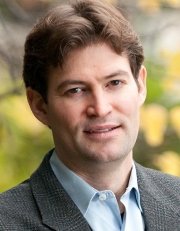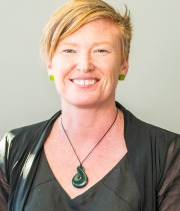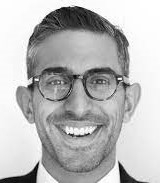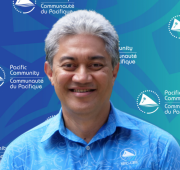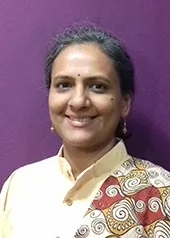This session will explore the drivers of health inequality, in particular the unequal exposure of at-risk and marginalised communities to the impacts of climate change and the disproportionate economic health burden they bear. By reference to case studies, speakers will examine the impact of rising sea levels, the high risk of devastating droughts, fires and floods, and the infrastructure and resources required to address their health consequences especially in countries less able to finance climate change adaption. The session will also consider what action governments industry and civil society must devise and further develop to redress the dual crises of climate change and health inequality.
Noah Diffenbaugh
Noah Diffenbaugh is the Kara J Foundation Professor and Kimmelman Family Senior Fellow at Stanford University. He studies the climate system, including the processes by which climate change could impact agriculture, water resources, and human health. Dr Diffenbaugh has served the scholarly community in a number of roles, including as a current Editor of the peer-review journal Earth's Future, and as Editor-in-Chief of the peer-review journal Geophysical Research Letters from 2014-2018. He has also served as a Lead Author for the Intergovernmental Panel on Climate Change (IPCC), and has provided testimony and scientific expertise to Federal, State and local officials.
Dr Diffenbaugh is an elected Fellow of the American Geophysical Union (AGU), and is a recipient of the James R. Holton Award and William Kaula Award from the AGU, and a CAREER award from the National Science Foundation. He has been recognized as a Kavli Fellow by the U.S. National Academy of Sciences, and as a Google Science Communication Fellow.
Fiona Haigh
Associate Professor Fiona Haigh is Director of the Health Equity Research Development Unit (HERDU) a joint initiative between the UNSW Centre for Primary Health Care and Equity and the Sydney Local Health District. Fiona is an equity focussed applied public health researcher with over 20 years’ experience internationally working with health and other sectors to strengthen the consideration of health and health equity in decision-making. Fiona believes that research needs to ‘walk the talk’ of social justice, directly facilitate improvements in people’s access to the determinants of health and value research participants as active collaborators and co-constructors of knowledge. Her main research focus is equity focused planning and decision-support tools such as Health/Human Rights/Equity Impact Assessment, the role of different types of knowledge in decision making, and the relationship between health and human rights. She is currently developing a Climate Change Vulnerability Health Impact Assessment Framework for health services.
Fiona has designed and taught university credit-bearing programmes on Health Impact Assessment as well as developed and conducted training sessions, workshops and ‘learning by doing‘ training models locally and internationally. Fiona is co-chair of the International Union of Health Promotion Global Working Group on Health Impact Assessment and the Steering Committee Member of the Society of Practitioners of Health Impact Assessment.
Amol Mehra
Amol Mehra, Esq. is the Director of Industry Transformation at the Laudes Foundation where he oversees programmes relating to transformation of the fashion and built environment sectors to address the dual crises of inequality and climate change. Previously, Amol served as Managing Director of the Freedom Fund, a leader in the global movement to end modern slavery, and as Executive Director of the International Corporate Accountability Roundtable (ICAR), a leading human rights organisation harnessing the collective power of progressive organisations to push governments to create and enforce rules over corporations that promote human rights and reduce inequality.
Amol serves as a Founding Member of Funders Organized for Rights in the Global Economy ("FORGE"); on the Advisory Council for the Center for Business and Human Rights at NYU Stern; on the Human Rights Advisory Committee of the Interfaith Center on Corporate Responsibility; on the Advisory Committee of the Investor Alliance for Human Rights and as a Commissioner on the United Nations Financial Sector Commission on Modern Slavery and Human Trafficking ("Liechtenstein Initiative").
Paula Vivili
Dr. Paula Vivili is the Deputy Director-General Science and Capability at Pacific Community-SPC. He was previously the Director of the Public Health Division at Pacific Community-SPC and held this position for six years (from 2013 to 2020). This experience assisted Dr. Vivili in his current role, providing him with an intimate knowledge of the Pacific Community, its people, and partners.
Dr. Vivili holds undergraduate degrees in Human Nutrition (University of Otago) and Medicine (University of the South Pacific) as well as a Master’s Degree in International Public Health (University of Sydney). In addition, he has also undertaken a World Health Organisation Fellowship at the University of Auckland and Auckland Hospital in Ophthalmology.
Josyula K Lakshmi
Josyula K. Lakshmi is a is a Senior Research Fellow at The George Institute for Global Health in India, working on the LIVING study – a lifestyle intervention for diabetes prevention in women with prior gestational diabetes.
She has a Bachelor's degree in Homoeopathic Medicine and Surgery, a Master of Science in Health Promotion, and a PhD in Health Promotion and Disease Prevention, and Gerontology. She has engaged in research and teaching in health promotion; health governance; the workforce engaged in traditional, complementary and alternative medicine; road safety; communication; environmental health; physical activity; nutrition; and ageing.

